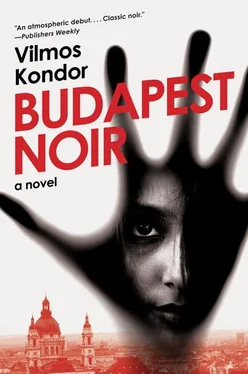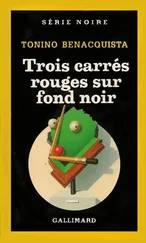“Maybe,” said Gordon, holding her gaze.
“What’s wrong with that?” she asked, and amid a smile she pursed her lips. “You don’t believe me.”
“I believe you,” he said, “and there’s nothing wrong with that. Nothing.” He cleared his throat. Gordon looked at the clothing strewn about the place: leftovers of a recent liaison. He stole a glance at the unmade bed that seemed to sprawl out in the other room, and at the thin streak of sunlight that shone upon it. Margo followed his gaze. Gordon now looked at the woman stretched out in the armchair opposite him—at her nightgown, her full round bosom, her slender ankles, her succulent lower lip. “Nothing in the whole damn world,” he added, all at once catching Margo’s gaze. He now saw clearly the fear in her eyes.
“Are you that scared?” he finally asked.
Margo did not reply.
“Don’t tell me you realized only now what sort of people your customers are and what they’re capable of.”
Almost imperceptibly the woman winced.
“How long have you been doing this?”
“Too long,” replied Red Margo.
Gordon rose from the armchair. “I’m off.” But he only stood there, staring at Margo. “That there,” he said, gesturing with his head toward the bedroom, “would have been only a reward for me doing the dirty work instead of you, huh?” The woman didn’t answer. “I know you’re afraid of them. And you’re right to be.”
“What do you think I should have done?” she asked.
“Everyone does what they know best,” said Gordon.
“What are you getting smart with me for?” Looking down, she added, “You don’t understand a damn thing.”
“You’re right,” said Gordon. “I don’t understand a damn thing.”
“You said you’re going. So go.”
Gordon was already at the door when she called after him: “Wait.”
He turned and looked at the woman. The sun lit her face from behind, and he couldn’t see her eyes. “Nothing,” Red Margo said softly before turning back to the window.
Gordon just caught a tram on Crown Prince Rudolf Square and got to the Abbázia in fifteen minutes. This time the waiter led him to his regular table, where he took Gordon’s order—a coffee and a brioche. On appearing with the tray, the man also handed him a sheet of paper.
“A note left here for you, Mr. Editor,” said the waiter, and left. The message was from Jenő Strausz, who had tried telephoning Gordon at nine-thirty to say he’d be at the Ironworks Sport Club in the afternoon. Gordon put away the paper and looked up at the clock on the wall. Almost noon. He pored over the papers and drank his coffee but left the brioche untouched. He then paid and left.
Despite the nippy autumn weather, Mór’s balcony door was open. Gordon shook his head with irritation and went upstairs to his grandfather. He knocked. No answer. He sighed. The old man must have nodded off by the stove. Gordon knocked once more, this time with more force, at which the door began to open with a creak. On its own. His stomach was in knots. Slowly he opened the door all the way, then stepped inside. Through the dark vestibule he headed toward the kitchen. He heard no noise and smelled no smoke, but this made him all the more uneasy. Gordon was just passing the bedroom when the door suddenly opened. He spun around and there saw Mór, holding a kettle of respectable size above his head with an iron grip.
“Hey, Opa, what are you doing?” he asked with great relief.
“I must have forgotten to lock the door,” said the old man, lowering the kettle. “A bunch of fresh chestnuts just arrived at the market from the hills, so I went out, bought a couple of kilos, and told myself I’d get started on the cooking right away. I went into the kitchen but forgot to lock the door on my way into the flat. Then you knocked, and . . .”
“I understand, Opa.”
“No matter who it was, with that kettle I would have let them have it,” said Mór.
“Without a doubt.”
They went to the kitchen. “I need your help, Opa.”
“No, son,” said Mór, shaking his head.
“No?”
“I’m not doing a thing until you tell me what you found out. I need to know why you wound up in danger and so did Krisztina.” He sat down at the table and waited.
Gordon pulled out a chair, sat down opposite his grandfather, and told him the whole story. He didn’t leave anything out. Not even that he knew who had left the dead chicken in front of Krisztina’s door. Nor that he’d been to Margo’s. And certainly not what he’d learned about Szőllősy. Mór listened in silence, asking not a thing, even though he clearly had questions. When Gordon finished, the old man stood up and went to the window.
“I don’t understand this, son,” he said.
“What don’t you understand?”
“What happened, I understand. But I don’t understand how this sort of thing can happen.”
“These things happen everywhere, Opa.”
“You know, son,” Mór began, “your grandmother and I really did have a privileged life back in Keszthely. We had everything—everything. Your father had a lovely childhood. They say that was an era of peace. I myself was ten years old when Buda and Pest united. We used to visit Budapest and Vienna. True, not often. Your grandmother would have gone even more, but I didn’t want to. Keszthely is a small town by comparison, but there were people of all sorts of backgrounds living there, too. Germans, Jews, and even a few Poles.” He sighed. “No matter. I don’t understand what’s going on here. I don’t understand a thing about this country of ours. The war, I understood. They shot at us; we shot back. By the end, that got murky, too. And what came after, that was even more muddled up. It’s been almost ten years since I moved to Budapest. I might have followed your parents to America. Not that I would have understood that country, either, but at least I would have known it was foreign. A foreign country, foreign language, foreign culture. This country here is my own, and I still don’t understand it.”
Gordon waited for his grandfather to turn around. “I know, Opa. I know.”
“So, what can I do?”
“I want you to get on your nicest suit and your surliest expression and go to Kaiser Wilhelm Road.”
“And?”
“Go up to the head office of the Arabia Coffee Company and look for András Szőllősy.”
“And?” asked the old man, knitting his bushy brows.
“Tell him you were sent by an advisor to István Bárcziházi Bárczy. The undersecretary must speak with him in a confidential matter. So confidential that he couldn’t say even by telephone, which is why you were sent in person.”
“You can’t just do that, son. Even I know who István Bárcziházi Bárczy is. He’s the prime minister’s right-hand man. And Horthy’s trusted advisor.”
“Don’t you worry, Opa. There won’t be any trouble. I guarantee you that Szőllősy won’t ask any questions.”
For a while the old man just sat there pondering the matter. “If you say so, son,” he finally said.
“I say so, Opa.”
“Good. So I go into his office and say that one of István Bárcziházi Bárczy’s advisors sent me. And?”
“Say he wants Szőllősy to get home by five o’clock, because he’s going to pay him a visit. There’s been a change in the German situation that they must discuss. No one is to know.”
“Do you know what you’re doing, son?” asked Mór, looking Gordon squarely in the eye.
“I hope so, Opa,” Gordon replied.
“That’s all? And why do you need me for that?”
“Because no one would believe me if I told them I work for an advisor of the prime minister’s undersecretary. And no one is capable of a sterner expression than are you. If the chestnuts can wait, I won’t be going anywhere just yet; I’ll go over with you.”
Читать дальше
Конец ознакомительного отрывка
Купить книгу












